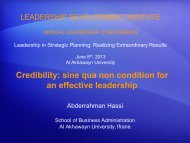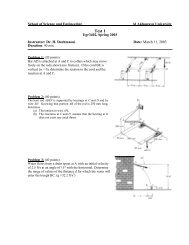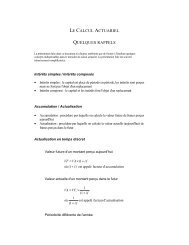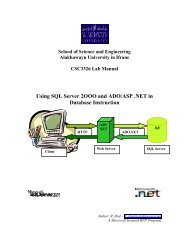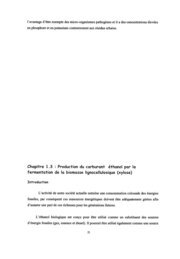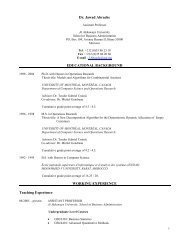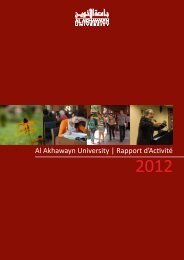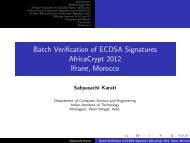Leadership and Values in Language Education - Al Akhawayn ...
Leadership and Values in Language Education - Al Akhawayn ...
Leadership and Values in Language Education - Al Akhawayn ...
- No tags were found...
You also want an ePaper? Increase the reach of your titles
YUMPU automatically turns print PDFs into web optimized ePapers that Google loves.
74Proceed<strong>in</strong>gs of the 27 th MATE Annual ConferenceI. IntroductionStudents as Media Audiences <strong>and</strong> Socialization:Trends <strong>and</strong> IssuesKhalid SoussiInstitut National des Postes et Télécommunications, Rabat.The recent brisk advances <strong>in</strong> new communication technologies have <strong>in</strong>exorablypervaded the socialisation process of the younger generations perhaps more thanany other generation <strong>in</strong> human existence. With students be<strong>in</strong>g exposed to aplethora of media - oscillat<strong>in</strong>g from video games, <strong>in</strong>ternet surf<strong>in</strong>g <strong>and</strong> chatt<strong>in</strong>g tosatellite TV channels – the old-established role of socialisation <strong>in</strong>stitutions likethe family or school is put <strong>in</strong>to question nowadays. In the same connection, theUN Convention on the Rights of the Child stressed to a great extent the obligationof states toward children to:“ensure that the child has access to <strong>in</strong>formation <strong>and</strong> materialfrom a diversity of national <strong>and</strong> <strong>in</strong>ternational sources, especiallythose aimed at the promotion of his or her social, spiritual <strong>and</strong>moral well-be<strong>in</strong>g <strong>and</strong> physical <strong>and</strong> mental health…” ( UNCRC,Article 17, 1989).The article at h<strong>and</strong> is not geared towards the debate of young adults’ rights tohave “access to <strong>in</strong>ternational sources of <strong>in</strong>formation” but to draw the attention ofeducators to the younger generations’ own statements, as well as their parents’,about their awareness <strong>and</strong> the effects they perceive of media on their socializationprocess. Dr. D. Walsh, for <strong>in</strong>stance, emphasizes that “electronic media (<strong>in</strong>clud<strong>in</strong>gtelevision, video games, movies, <strong>and</strong> computers) can have profound effects onyoung children because of the power of the media to set examples for youngcitizens to follow”. Interpret<strong>in</strong>g the young citizens’ reports is another target of thearticle at h<strong>and</strong>. The last one is to connect this overspread<strong>in</strong>g phenomenon <strong>in</strong> theMoroccan society to the educational context <strong>and</strong> to suggest ways <strong>in</strong> which<strong>in</strong>structors can turn the <strong>in</strong>cessant flow of media content <strong>in</strong>to young lives <strong>in</strong>to aconstructive medium for tomorrow citizens.The follow<strong>in</strong>g section def<strong>in</strong>es some of the central terms to this study. Then, thesubjects, circumstances <strong>and</strong> methodology of data collection followed <strong>in</strong> thisexploratory <strong>in</strong>vestigation are meticulously described <strong>in</strong> the subsequent sections.



